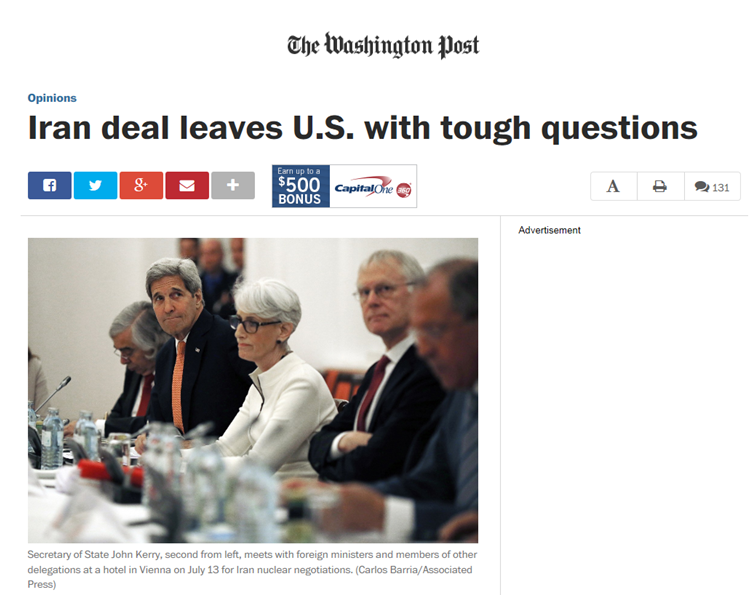The deal with Iran is finally done. Given the stakes, it should be scrutinized. It makes sense to reserve judgment and see how the administration explains all the clauses of the agreement and how they will be implemented.
While I look forward to the administration’s full explanation of the deal and its annexes, a number of observations are possible now. First, the outcome appears largely consistent with the framework agreement announced April 2. The most important achievements of the framework remain intact: The number of centrifuges in operation must be reduced to 5,060 from the current 9,500; Iran’s stockpile of low-enriched uranium must be cut from 10,000 kilograms to 300. The former must be observed for 10 years and the latter for 15. The extensive monitoring of the entire supply chain, from the mining and milling of uranium, to the conversion of yellowcake and the enrichment of uranium hexafluoride, or UF6, will continue for 25 years. The core of the heavy-water reactor at Arak must be removed and redesigned, and no reprocessing capabilities will be permitted. And the Iranians will be obligated to observe the Additional Protocol of the Nuclear Non-Proliferation Treaty forever.
In practice, these limitations and the verification associated with them make it highly unlikely that the Iranians could divert materials for a covert program or would be in a position to break out to weapons-grade material in less than a year for the eight and a half to 10 years that the restrictions on the number and types of centrifuges apply. And with no reprocessing permitted, a plutonium pathway to a bomb is essentially blocked.
That is the good news. The bad news is that the vulnerabilities of the deal — and some of its more worrisome implications — remain as well. First, because the Iranians are not required to dismantle their enrichment infrastructure, are allowed to continue at least limited research and development on their five advanced models of centrifuges and will be permitted to build as large an industrial nuclear program as they want after year 15, the deal, at that point, will legitimize the Islamic republic as a threshold nuclear state. The gap between threshold status and weapons capability will necessarily become small, and not difficult for the Iranians to bridge.
Third, since the deal is essentially a rollback of sanctions for transparency, it depends heavily on the Iranians allowing access to suspect sites. Will inspectors have access when they need it or only when the Iranians permit it? Will the Iranians, who are speaking of “managed access,” challenge the justification for inspecting military, Revolutionary Guard or scientific facilities? Will every challenge be turned into a negotiation?
As Congress evaluates the deal, the administration needs to address each of these vulnerabilities. In the first instance, for example, it should acknowledge the danger of Iran being a threshold nuclear state and explain how it will establish deterrence by making clear to the Iranians and the international community that it will not permit Iran to become a nuclear weapons state. I would argue that the Iranians must believe that any such move will trigger the use of force — anything less, once they have threshold status, and Iran will know that it can confront the world with a nuclear weapons fait accompli at a time of its choosing.
In the second, the administration will need to outline its plans to counter the Iranians if they start pouring money into Hezbollah and other Shiite militias. The administration should discuss responses with the Europeans, including targeted economic sanctions, and begin to develop countervailing options now with our regional friends — Arabs and Israelis alike.
Lastly, the administration will need to explain why the response mechanisms meant to address access issues or possible violations will not become new negotiations that can be drawn out, permitting the Iranians to scrub suspect sites or cheat along the margins. Spelling out consequences that cannot be blocked even for the smallest transgressions will be important in this regard.














Comments are closed.